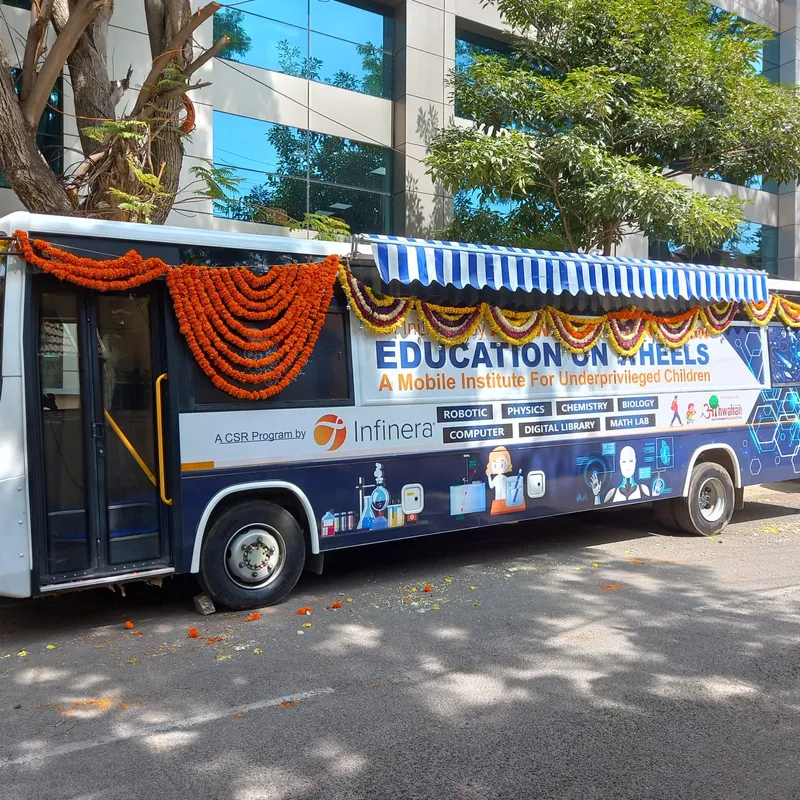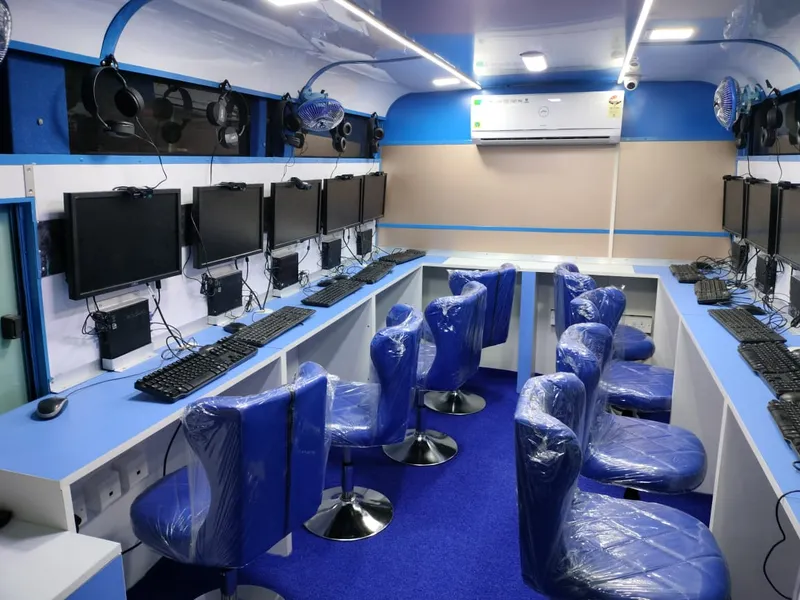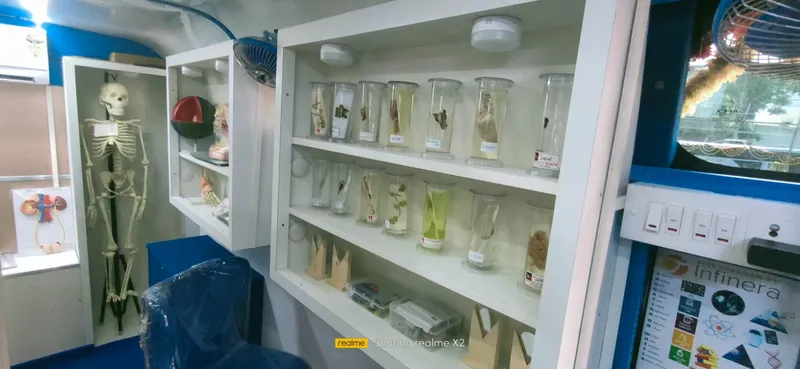Education on wheels: An NGO is helping students via on-demand learning
Bengaluru-based Aahwahan Foundation has launched an ‘Education on wheels’ programme to bridge the educational divide in rural Karnataka.
The COVID-19 pandemic highlighted the reality of the urban and rural divide. This was especially true for the education sector as while the rich could access online classes, economically challenged students could not.
According to Unified District Information System for Education (UDISE) Plus 2021-22 report, the dropout rate at the primary level (Classes 1 to 5) has increased by 1.5% from 0.8% in 2020-21. The dropout rate at the upper primary level (Classes 6-8) has increased to 3% compared to 1.9% in 2020-21.
Bengaluru-based is helping students catch up with their peers. The NGO launched its flagship programme 'Education on Wheels,' in January 2023, intending to reach the doorsteps of every underprivileged student across different locations in the state of Karnataka.
The NGO works across various sectors such as education, health, women empowerment, and community living. It also conducts beach cleaning, plantation, and blanket donation drives.
"Change comes with the rolling wheels where you move your thought from the present situation to a paradise. With such a motive, we set forth to bring a new kind of education to the underprivileged," Braja Kishore Pradhan, Founder of Aahwahan Foundation, tells SocialStory.
Education on wheels

Education on wheels bus (Credit: Aahwahan Foundation)
The NGO has three buses, each comprising of a biology lab, chemistry lab, physics lab, maths lab, computer lab, robotics lab, and a digital library. The library has more than 13,000 books which can be accessed within a radius of 150 m of the bus.
The organisation aims to provide scientific and technological education to students from sixth standard to high school. Apart from science and technology, it also offers courses for digital marketing, soft skill development, personality development, as well as for competitive exams such as UPSC (Union Public Service Commission), and JEE (Joint Entrance Examination).
Aahwahan has six permanent teachers, four volunteers, and seven to eight part-time faculty. The faculty comprises teachers who hold a master's degree or are pursuing or have completed their PhDs. Besides this, they have also associated with some institutes for teaching robotics.
"We have video conferencing in our buses, which enables our students to get first-hand experience of what is being taught in good institutes and universities we have tied up with them," Pradhan adds.
The content is either prepared by the teachers or is outsourced from Vedantu, BYJU'S, and WhiteHat Jr. The teachers are present in the bus to supervise and help the students with their problems.
The team visits the villages first and registers the students. They are provided with headphones and a computer system to log into their respective online lectures.
"We map out village clusters and spend three hours in each village for three days. We usually start by 7:30 am and mostly get over for the day at 8 pm. These buses also visit schools and provide hands-on practical experience to the students," Pradhan explains.
Before launching the programme, the NGO conducted extensive research and found that most government schools in India needed more proper infrastructure and qualified teaching faculty, which were significant obstacles for students in their learning journey.
The study conducted by the NGO identified various areas that needed to be addressed, including digital, technical, science, and robotics education alongside the issue of girls dropping out of school after 10th grade due to family pressure or financial constraints.
"In large schools with a strength of 500+ students, it is possible to build these facilities, but in smaller schools, it is not possible. So we came up with the idea of taking education to their doorstep," Pradhan says.

Computer lab inside the bus (Credit: Aawahan Foundation)
Challenges faced so far
Building an ecosystem for providing doorstep education is a challenging task. "The major challenge we faced was to convince parents that we will not be charging anything so they can spare at least an hour and send their child. They were skeptical because most of the children dropped out of school because they did not have money,” the founder says.
More than 4,890 students have registered in the programme, of which around 2,743 are girls. Aahwahan has also aided more than 427 students in securing jobs in DTP centres and BPOs, of which 143 are girls.
The NGO has also tied up with 208 schools in Karnataka, where it provides basic infrastructure like drinking water facilities, toilets, uniforms, smart classrooms, and table chairs and aid in the overall development of the school.

Biology lab inside the bus (Credit: Aawahan Foundation)
The foundation also started the "Laptop Bank" programme in September 2020. The move aimed to enable education and fulfill the lack of access to online devices. The students could use the borrowed laptops to study from home for two to three hours or attend online classes.
The programme benefited around 3031 students, including Bengaluru, Mumbai, Pune, Delhi, and Noida, and has distributed 433 laptops.
The way forward
The foundation targets to have at least ten buses by the end of 2023. Presently its bus travels across rural, semi-rural, and semi-urban locations, slums, government schools, and colleges in Karnataka. It covers different areas in Bangalore city and the outer city and the nearby regions like Mangalore, Hubbali, Hosakote, Hosur, Belgaum, and Mysuru.
In the next phase, the NGO plans to expand across different states. For their expansion plans, Aahwahan is also approaching corporates to come forward and support this initiative.
Edited by Affirunisa Kankudti




1563291112187.png?fm=png&auto=format&h=100&w=100&crop=entropy&fit=crop)




